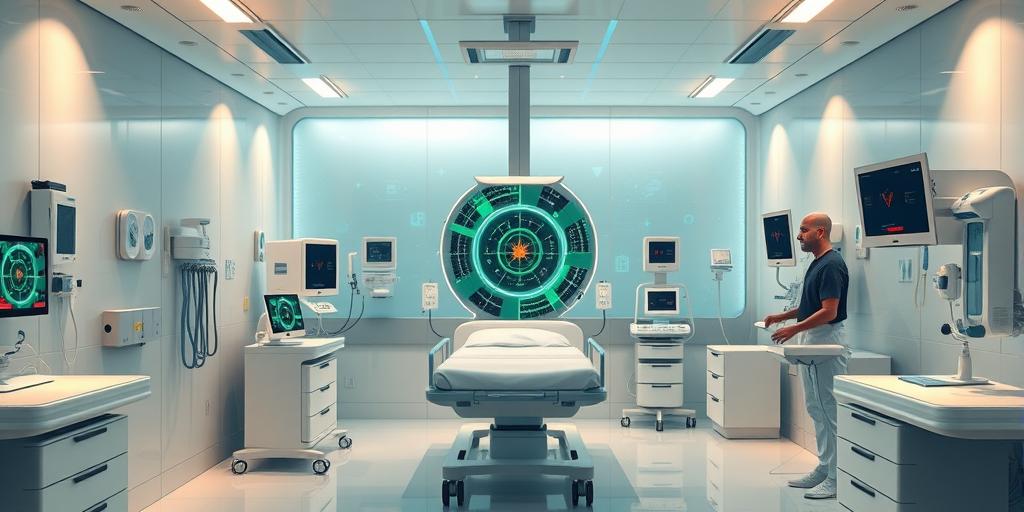The Internet of Things (IoT) is rapidly transforming numerous sectors, and healthcare is no exception. Prepare to be amazed as we delve into the groundbreaking ways IoT is poised to revolutionize healthcare as we know it, impacting everything from patient care to medical research. This isn’t just about futuristic gadgets; it’s about tangible improvements in lives today and even more profound changes on the horizon! Get ready to explore the exciting intersection of technology and medicine that promises a healthier future for us all.
Enhanced Patient Monitoring and Remote Care
Imagine a world where chronic conditions are managed effectively from the comfort of your home, reducing hospital readmissions and improving patient outcomes. This is the promise of IoT-enabled remote patient monitoring (RPM). Wearable sensors and connected medical devices continuously collect vital health data – heart rate, blood pressure, blood glucose levels – and transmit it securely to healthcare providers in real time. This allows for proactive intervention, preventing potentially life-threatening situations before they escalate. For patients with conditions like heart failure or diabetes, RPM provides peace of mind and a higher quality of life. The real-time data facilitates immediate adjustments to medication or treatment plans, resulting in better disease management and improved patient compliance. This shift from reactive to proactive care is a game-changer.
The Rise of Wearable Technology
Smartwatches, fitness trackers, and other wearable devices are increasingly integrated with RPM systems, becoming powerful tools for collecting and analyzing health data. These devices are not merely fitness trackers; they are sophisticated sensors, capable of detecting irregularities and alerting medical professionals to potential health issues. The ease of use and convenience of wearables improve patient engagement and empower individuals to actively participate in their healthcare management. The availability of convenient, user-friendly technology empowers patients to take a more active role in managing their own well-being.
Remote Diagnostics and Telemedicine
IoT extends its reach beyond simple data collection. Remote diagnostics allows for early detection of potential problems, providing opportunities for timely interventions. The integration of IoT with telemedicine platforms enables virtual consultations, making healthcare more accessible to geographically isolated populations or individuals with limited mobility. This innovative combination of technologies bridges geographical barriers and increases access to expert medical care, regardless of location. This development is of particular benefit to elderly or disabled patients who might find it difficult to travel to appointments.
Streamlined Hospital Operations and Improved Efficiency
Hospitals are complex environments with numerous interconnected systems. IoT is revolutionizing hospital operations by enhancing efficiency, improving safety, and reducing operational costs. From real-time location tracking of medical equipment to automated inventory management, IoT-powered solutions are streamlining workflows and freeing up staff time. This frees up valuable time and resources, allowing healthcare workers to focus on what matters most – direct patient care.
Smart Medical Equipment and Inventory Management
IoT sensors can be embedded in medical equipment, tracking its location, usage, and maintenance requirements. This prevents equipment loss, reduces downtime and ensures that it’s available when needed, optimizing resource allocation and minimizing equipment-related delays. Similarly, real-time tracking capabilities are reducing equipment shortages and improving workflow efficiency throughout the hospital. Real-time visibility of assets ensures that equipment is utilized effectively and available when needed. The combination of optimized inventory management and the enhanced efficiency of asset allocation is leading to significant cost savings and improved patient care.
Enhanced Hospital Security and Safety
IoT plays a crucial role in enhancing hospital security and patient safety. Smart access control systems, security cameras, and patient monitoring systems enhance security, protecting both staff and patients from potential threats. This integrated approach significantly increases the safety and security within healthcare facilities, creating a more secure environment for staff and patients. The increased surveillance and improved response times are significantly reducing safety concerns.
Advancements in Medical Research and Drug Discovery
IoT is accelerating medical research and drug discovery through the collection and analysis of massive amounts of patient data. Wearable sensors, connected medical devices, and electronic health records provide researchers with unprecedented insights into disease progression, treatment effectiveness, and individual patient responses. This data-driven approach to medical research and development is leading to the discovery of new treatments, therapies and improvements in patient outcomes.
Personalized Medicine and Data Analytics
The wealth of data gathered by IoT devices allows for personalized medicine, tailoring treatments to the unique genetic, lifestyle, and environmental factors of individual patients. Advanced data analytics techniques identify patterns and trends that would be impossible to discern through traditional methods, significantly accelerating the pace of medical breakthroughs. This enables a more precise and effective approach to healthcare. By tailoring treatments to the unique needs of each patient, improvements in outcomes are substantial.
Improved Clinical Trials and Data Management
IoT streamlines clinical trials by facilitating remote data collection and monitoring, improving efficiency, and reducing costs. The ability to track patient progress in real time enhances the accuracy and reliability of trial results. The efficient management and analysis of data improves the overall speed and reliability of clinical trials. This leads to faster delivery of new treatments and therapies to those who need them.
The Future of IoT in Healthcare: A Glimpse Ahead
The integration of IoT into healthcare is still evolving, with countless possibilities yet to be explored. From sophisticated AI-powered diagnostic tools to predictive analytics for preventing disease outbreaks, the future holds immense potential for further advancements. As technology continues to evolve and improve, we can expect even more innovative and effective uses for IoT in the realm of healthcare. This exciting intersection of technology and medicine promises a healthier, more efficient, and personalized healthcare system for the future. Are you ready to embrace these innovations and take charge of your health in the digital age?
Call to Action: Want to stay ahead of the curve in the world of healthcare technology? Subscribe to our newsletter for the latest insights and updates on the transformative impact of IoT!




